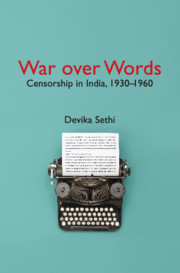Book contents
- Frontmatter
- Dedication
- Contents
- Acknowledgements
- List of Abbreviations
- Introduction
- Part I Guarding the State, Protecting the Public: Censorship Policies and Practices in the 1930s
- Part II Protests and Publicity: Banning Non-Indian Authors
- Part III Political or Military? Censorship in India during the Second World War
- Part IV The Censored Turn Censors: Freedom and Free Speech
- Conclusion
- Epilogue
- Bibliography
- Name Index
- General Index
Part I - Guarding the State, Protecting the Public: Censorship Policies and Practices in the 1930s
Published online by Cambridge University Press: 26 April 2019
- Frontmatter
- Dedication
- Contents
- Acknowledgements
- List of Abbreviations
- Introduction
- Part I Guarding the State, Protecting the Public: Censorship Policies and Practices in the 1930s
- Part II Protests and Publicity: Banning Non-Indian Authors
- Part III Political or Military? Censorship in India during the Second World War
- Part IV The Censored Turn Censors: Freedom and Free Speech
- Conclusion
- Epilogue
- Bibliography
- Name Index
- General Index
Summary
Laying the foundation stone of a new building for The Pioneer newspaper in Lucknow in 1936, the British Viceroy, Lord Linlithgow, reminded his audience, likely comprising many journalists, of the power the press wielded over public institutions and public opinion. The proprietors and editors of newspapers have a ‘grave responsibility’, he said, ‘towards the State and towards the public’. In a sense, censorship of publications was acknowledgment— howsoever perverse—of the power wielded by the printed word. An Indian journalist has described the 1930s as the decade of the ‘adulthood of the Indian Press, not to say middle age!’ At the beginning of that decade, The Hindu had already been around for 50 years; the Times of India for almost a century. At the same time, according to the 1931 census, fewer than 10 out of every 100 Indians could read. In fact, colonial authorities termed this low level of literacy a ‘very serious obstacle’ to attaining ‘full self-sufficing nationhood on modern democratic lines’. However, they also recognized that it was precisely this low level of literacy that accorded educated Indians disproportionate influence and gave rumour peculiar force. In 1930 the Simon Commission report commented:
In a country where the number of literates is very small, the formation of opinion depends far more on the spoken than on the written word. Rumour counts for more than reading; but the most exaggerated rumour finds its way into a certain class of Indian newspaper, and the influence of the man who can read is necessarily very great. We have pointed out … how gravely the interests of good government are undermined, and confidence in the administration is shaken, by the distortion and misrepresentation practiced with impunity by some Indian newspapers, and by the absence of adequate means of counteracting it.… Except for an occasional address by the Viceroy, or by a Governor, and except for speeches made by officials in the legislatures, political advocacy is left to the critics.… The danger [to organized authority] is all the greater because India is a place where hearsay, however improbable, seems to gain widespread credence and to be capable of rousing fierce passion.
- Type
- Chapter
- Information
- War over Words , pp. 21 - 24Publisher: Cambridge University PressPrint publication year: 2019



